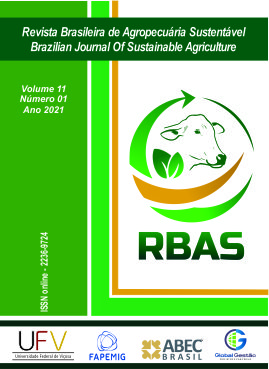TANDARDIZATION OF SEEDS AND IMPLICATIONS ON WHEAT YIELD AND PRODUCTIVITY
DOI:
https://doi.org/10.21206/rbas.v11i1.12058Keywords:
Triticum aestivum L., science and technology of seeds, technical standards, production of seedsAbstract
There is influence of size of the wheat seeds in the traits of importance agronomic. Thus, this study aimed to determine the effect of the size of wheat seeds in the yield components and grains productivity. The study was carried out in the 2016 harvest. Apllied is the experimental design was a randomized block, organized in factorial design, with three wheat cultivars x six seed lots x five sizes of sieves, the treatments were arranged in three replicates. Were measured characters as grain yield (kg ha-1), mass of thousand seeds (g), hectoliter mass (kg hct-1) and economic analysis obtained through profitability per hectare (R$ ha-1). The size of wheat seeds influences the number of spikelets of the principal plant, number of primary and secondary seed, number of seeds of the principal plant, primary and secondary tillers, productivity, mass of thousand seeds and hectoliter weight. The standardization of wheat seeds provides benefits to the productive yield of wheat plants. The seeds retained in the sieve V (<2.00 mm) resulted in less productive plants; and plants derived from sieve III (2.5 to 2.99 mm) formed plants with higher productivity being 2.3% higher than the original sample. Also, it was 2% higher than the sieve II (> 3,0 mm), 2.7% compared to sieve IV (2.0 to 2.49 mm) and 6% from sieve V (<2.0 mm).
Downloads
Downloads
Published
How to Cite
Issue
Section
License
Copyright (c) 2021 Brazilian Journal of Sustainable Agriculture

This work is licensed under a Creative Commons Attribution-NonCommercial-NoDerivatives 4.0 International License.
1. Proposta de Política para Periódicos de Acesso Livre
Autores que publicam nesta revista concordam com os seguintes termos:
Autores mantém os direitos autorais e concedem à revista o direito de primeira publicação, com o trabalho simultaneamente licenciado sob a Licença Creative Commons Attribution que permite o compartilhamento do trabalho com reconhecimento da autoria e publicação inicial nesta revista.











